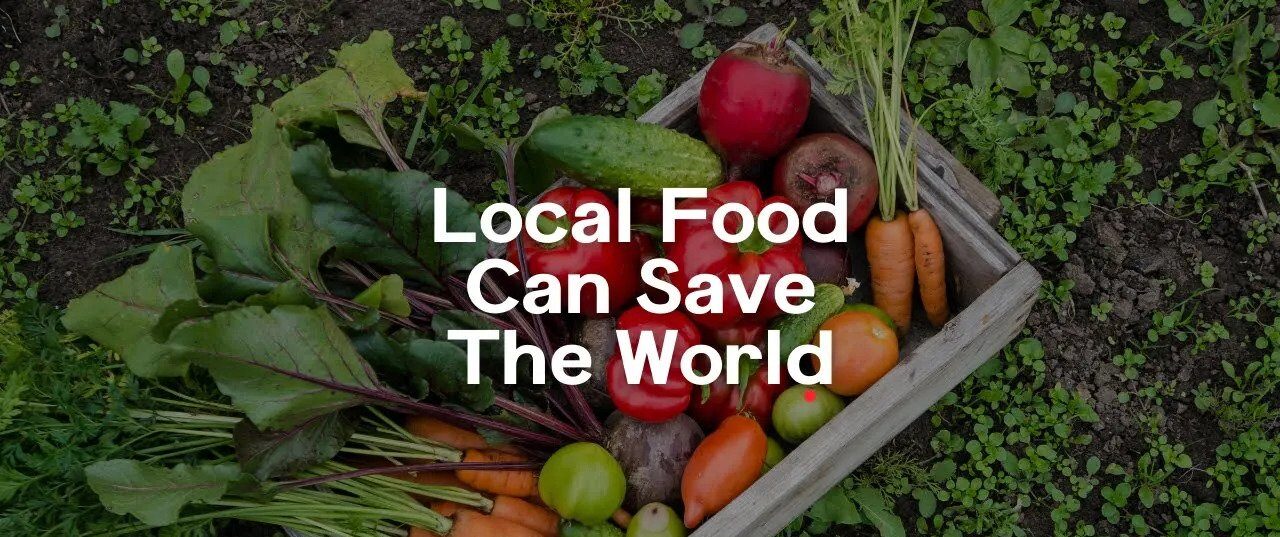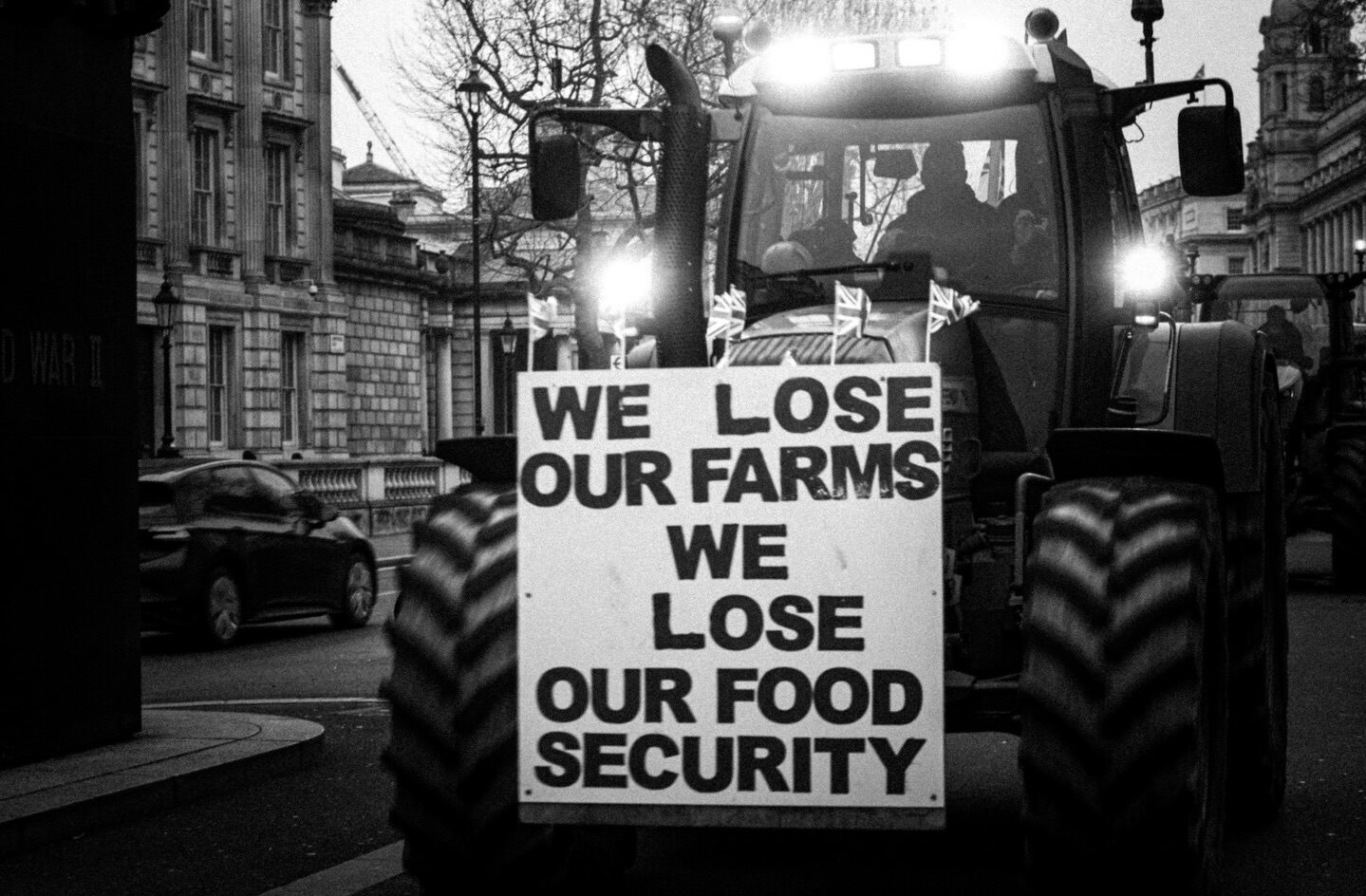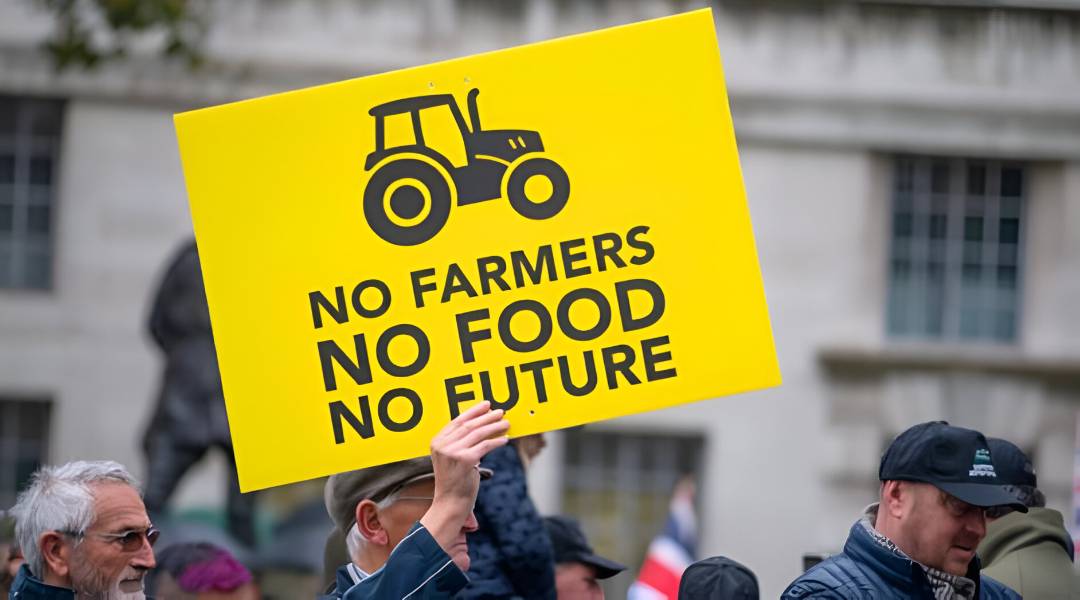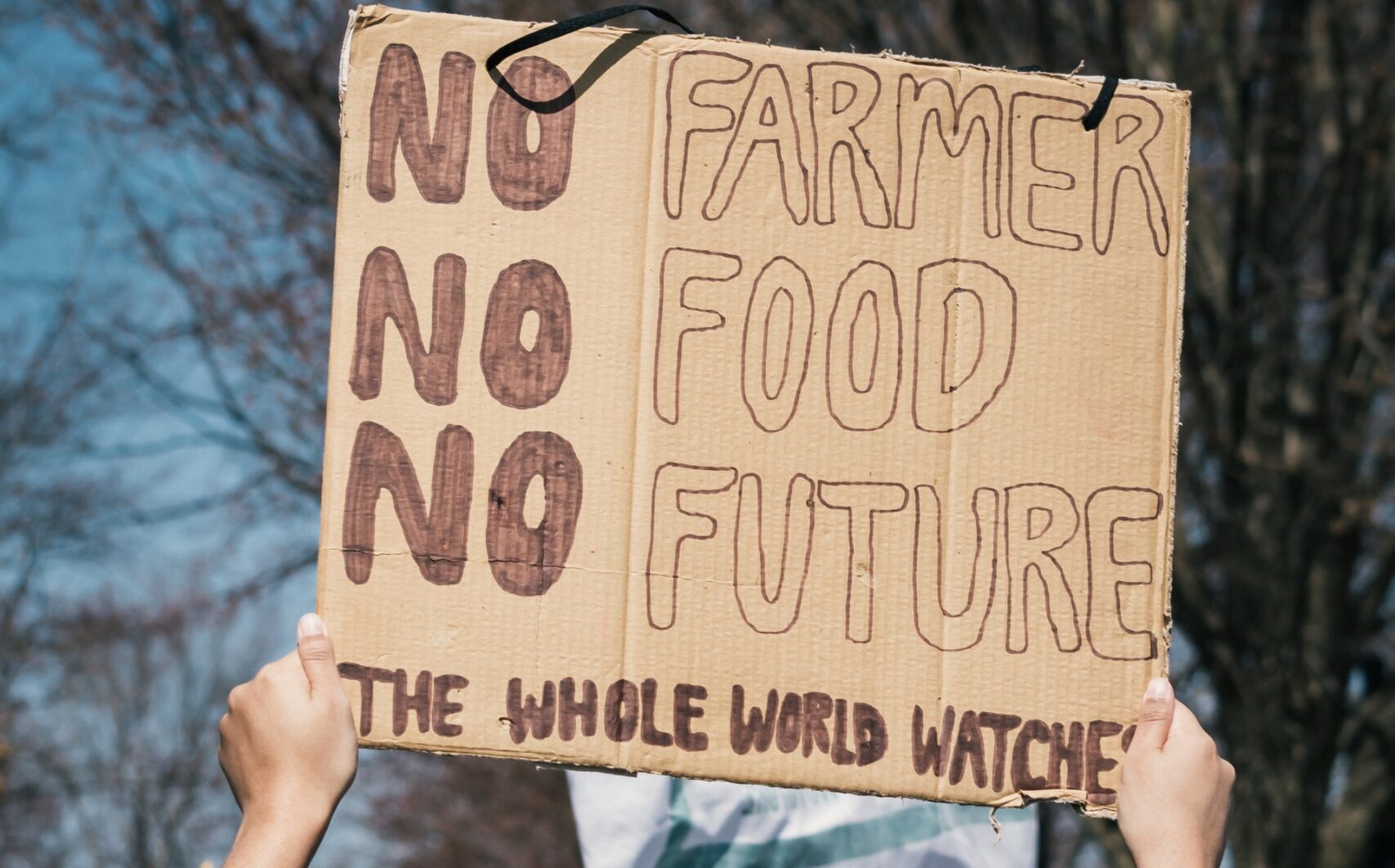World Localisation Day 2021
It’s not too late to join this week-long #WorldLocalizationDay (last day: 20th June) online program from Local Futures focusing on shifting the food system from global to local as the single most effective way of reducing environmental breakdown and restoring secure livelihoods. Contributors include Naomi Klein, Charles Eisenstein, Russell Brand & many more. Free tickets available now. Even if you can’t listen to them immediately, it is well worth adding it to your ‘to be watched’ list because the speakers from around the world are the wisest and most inspiring on how we relocalise the food economy.
Also see Local Futures clever 3 minute video – Insane Global Trade
UK/Australia trade deal agreed
The UK’s first new trade accord with another country since Brexit, the UK/Australian Trade Deal, was agreed this week with little safeguards for UK farmers’ livelihoods. To silence opposition against low standard imports that would undermine UK farmers, the Government established the Trade and Agriculture Commission, supposedly to scrutinise all new trade deals, but to date the Commission does not officially exist! So Boris Johnson is free to continue to sacrifice our farmers on the altar of his neoliberal mindset.
“Ministers have been accused of jeopardising the livelihoods of thousands of farmers after it emerged that a new trade deal with Australia will permit huge increases in meat imports before any protective tariffs come into force.”
The trade deal with Australia,13,000 sea-miles away, will undercut UK farmers with imports of substandard meat that is only cheap because of appalling production methods in Australia, not least the dosing of pigs with the muscle building drug Ractopamine, banned in 160 countries including the EU, and the continuous use of antibiotics in cattle to promote growth, a practice that was banned in the EU in 2006 as it was contributing to the alarming rise in antibiotic-resistant diseases in humans. As many Remainers feared (and many Brexiters hoped they could prevent from outside the EU), Brexit has resulted in a bonfire of regulations and protections that, along with the phasing out of the EU Basic Payment Scheme, will leave thousands of UK farmers struggling to survive in a perfect storm of the Tory government’s free-market fundamentalism, arrogance, ignorance, mismanagement and incompetence.
The Australian Parliament gets a vote on the Australia-UK Free Trade Agreement. Why is Liz Truss afraid to let the House of Commons have a meaningful debate on it? What is she hiding? The next Opposition Day debate is an opportunity for the Labour Party to ensure proper parliamentary scrutiny of this deal that would:
- endorse animal cruelty,
- damage our agricultural sector,
- and break yet more Brexit promises.
Join us in calling on Keir Starmer to use the next available Opposition Day to shine a light on this awful deal by signing this petition.
It gets worse, new trade deals, including this one, allow corporations to sue governments for compensation in secret courts if their profits are affected by government policies to reduce pollution, comply with climate targets or regulate products that are damaging to human health. This would discourage a future UK government from insisting that beef imports are not raised using antibiotics as a growth promoter, or using hormones, or being confined in inhumane, overcrowded and polluting feedlots.
Nick Dearden, Director of Global Justice Now wrote in the Guardian,
“The problem is with the type of trade deals we’re signing. It isn’t even about trade per se. We already have historically low tariffs with most western countries, and as the Australia deal shows, it simply isn’t true that new trade deals add thousands of jobs to our economy. Any claims of boosting growth are of a fraction of a percent over 15 years – completely unnoticeable compared to the effects of the pandemic.”
“Trade deals are, instead, about clearing away obstacles to the free movement of goods, services and money around the world. Those “obstacles” are often our most cherished food standards, protection of public services and our right to regulate corporations. The climate crisis makes all of these things much more important.”
Antibiotics under the radar
With artificially cheap food imports continuing to flood the UK market, it is impossible for our farmers to improve their standards and so prevent the use of antibiotics to keep miserable animals alive in intensive conditions. The Centre for Investigative Journalism has just revealed that, although the overall use of farm animal antibiotics in the UK has declined over the past four years, factory farmers are increasing the use of antibiotics that are critically important in human medicine to treat diarrhoea in piglets. Instead of treating the root cause, they are treating the symptom of sick piglets caused by weaning them at only 21 days, far too early for their immune system to develop properly or for their mothers to complete passing on antibodies in the milk. Note that organically raised pigs cannot be weaned until they are at least 42 days old, and are therefore healthy and do not need antibiotics.
‘Aminoglycosides are deemed “critically important” to human health by the World Health Organization, but are used on pig farms to combat scour [diarrhoea] and other illnesses.
Data compiled by the Agriculture and Horticulture Development Board, released after a freedom of information request, shows the use of aminoglycosides in pigs increased from 2.6mg a kilogram of body weight in 2015 to 5.9mg in 2019.
In 2018, the European Medicines Agency warned that “the use of [aminoglycosides] in human and veterinary medicine is associated with the increased prevalence of resistance”, citing examples of drug-resistant E coli, salmonella and livestock variants of MRSA (methicillin-resistant Staphylococcus aureus).
Responding to the findings, Cóilín Nunan, scientific adviser at campaign group Alliance to Save our Antibiotics, said reductions in antibiotic use could be achieved “if pigs are kept less intensively and husbandry is improved”.
He said farms should not be permitted to take piglets away from sows at an early age, which he described as a “stressful practice associated with large increases in antibiotic use”
Jim O’Neill, who chaired the government’s review into superbugs, told the Guardian that the Covid-19 pandemic had underlined the need to put drug-resistant bacteria back on the global political agenda. “There needs to be much stronger international agreement, and discipline following those agreements, that we will dramatically reduce the use of antibiotics in animals – especially those that are critical for human health,” he said.’
Food Sovereignty
The cure for the global pandemic of insane and toxic trade, with its ‘cheap’ factory farmed meat criss-crossing the globe in search of new markets to generate corporate profits, is Food Sovereignty, a term first coined in The Nyeleni Declaration, named after a legendary Malian peasant farmer who developed crops to feed her people.
The right of peoples to healthy and culturally appropriate food produced through ecologically sound and sustainable methods, and their right to define their own food and agriculture systems. It puts the aspirations and needs of those who produce, distribute and consume food at the heart of food systems and policies rather than the demands of markets and corporations. It defends the interests and inclusion of the next generation. It offers a strategy to resist and dismantle the current corporate trade and food regime, and directions for food, farming, pastoral and fisheries systems determined by local producers and users. Food sovereignty prioritises local and national economies and markets and empowers peasant and family farmer-driven agriculture, artisanal – fishing, pastoralist-led grazing, and food production, distribution and consumption based on environmental, social and economic sustainability. Food sovereignty promotes transparent trade that guarantees just incomes to all peoples as well as the rights of consumers to control their food and nutrition. It ensures that the rights to use and manage lands, territories, waters, seeds, livestock and biodiversity are in the hands of those of us who produce food. Food sovereignty implies new social relations free of oppression and inequality between men and women, peoples, racial groups, social and economic classes and generations.
News round-up
⛔ Death by Suicide: The Unethical Practices of Corporate Agribusiness
American farmers are dying by suicide, eco-anxiety is on the rise, and corporate agribusiness is at the center of this growing mental health crisis. For generations, and with great pride, family farmers have tended the same land their great-great-grandparents did, producing healthy foods and taking care of the environment by being good stewards of their land. Today, family farmers are approaching endangered status from the corporate takeover of their farms.
? How stressed out are factory-farmed animals? Artificial Intelligence is being touted as the answer.
“…while the idea of learning more about what animals are feeling is self-evidently enticing — why wouldn’t we want to learn more about them? — some animal welfare advocates question the very premise of this research. While the bulk of the funding is from the UK government, one reason for the skepticism is that the research is partly supported by companies in the meat and agriculture industry, including a pig genetics company that has availed its farms for the study. It’s not hard to see that industry’s interest in this work: Keeping more pigs alive under intensive conditions would be a financial boon, as would being able to advertise how “happy” the animals were — something the Centre’s website suggests could be possible.
And that all leads to a deeper question: Just how comfortable — let alone happy — can a pig be on a factory farm? In the US, nearly all pigs raised for meat are kept in unnatural, highly mechanized, and crowded conditions, given no access to the outdoors. Conditions are similar in much of the European Union, and factory farming is on the rise in low- and middle-income countries as global demand for meat increases. These environments are so difficult to endure that, by some estimates, up to 35 percent of US-raised pigs die before ever reaching the market.”
? National Sheep Association raises concerns over availability and capacity of UK abattoirs
“Government policy has led to a steady decline in the network of small and medium sized, multi-species abattoirs in the UK. A report by the All-Party Parliamentary Group for Animal Welfare on small abattoirs highlighted the decline of licensed abattoirs in the UK since the 1930s with the number of licensed abattoirs in the UK decreasing over the years from 30,000 registered in the 1930s to around 250 today. The loss of smaller, local abattoirs has meant that livestock has had to travel longer distances within the UK and it has led to an obstacle for those trying to establish local and direct supply chains at a time when there is clear consumer interest.”
☣️ River pollution Wales: Farmers face a ‘six-figure sum’ to comply with new regulations to store animal waste to prevent runoff from excessive farm animal manure and chemical fertilisers. Competing with giant factory farms across the EU has forced many smaller farms to stock too many animals in sheds and on the land in the first place. However, in a global economy, complying with regulations to stem environmental pollution can only be afforded by the new build giant factory farms and it doesn’t get rid of the problem as they still have to dispose of their excessive quantities of waste, and cure other costs such as animal cruelty and disposing dead animals, overuse of antibiotics, noise and co2 emissions from traffic carting pigs to market and animal feed to the farm and , toxic stench and flies from biodegrading animal faeces.
Local farmer; ‘I can see farmers leaving the industry and a change in farming where farms will get bigger with even larger dairy units’.
Farmers’ unions have described the measures as “draconian”, and said the costs of upgrading facilities could be too much for some smaller farms.
❗ Edwin Poots, Northern Ireland’s Agriculture, Environment and Rural Affairs Minister, is accused of ‘waging war’ on New Decade New Approach climate crisis promises. Friends of the Earth NI Director James Orr told Belfast Live:
“Instead of waging war on the climate crisis the minister is waging a war on the Climate Bill. We must wake up to the fact that we have a climate emergency and grasp the opportunities for a just transition…This means better quality food, farms not factories, more public transport, renewable energy in the right place and helping nature to be restored…Northern Ireland is not performing well in reducing greenhouse gas pollution,” he added.”
In our 2018 interview in Pig Business in Northern Ireland, Poots declares his wholehearted support for the corporate control of farming in a global free trade environment.
? FeedBack’s meat and climate scorecard for UK supermarkets.
“The ranking scores retailers across a number of indicators, including whether they’re adopting adequate corporate policies and targets on climate and meat, whether they’re offering better meat options not linked to deforestation, and whether they’re prioritising the sales of healthy food like fruit and vegetables. The ranking also looks at how well retailers are translating their corporate climate policies into practice in-store – that is, the action they are taking, like using clear labelling, offering a range of plant-based foods and better meat options, and using promotions and loyalty card points to support sustainable and healthy choices, such as buying fruit and veg”
? Farm Forward 15min video explains why factory farms are breeding grounds for pandemics!
“In this interview with Dr Katrien Devolder (University of Oxford), Professor Aaron S. Gross (University of San Diego) explains why factory farms are breeding grounds for pandemics, and what we, as individuals, can do to help end factory farming.”
? The Landworkers’ Alliance have launched a film club where you can join in on films and Q and A sessions. Lately films have covered topics such as agro-ecology and rewilding in Scotland, and the land use conflicts that exist between farmers and conservationists.
Please donate
Forgive me for pointing out that, while we receive some one-off donations, I am funding Farms Not Factories myself, and if we are to continue to fight the cruel, antibiotic-led factory farm system, we will need some regular donations from like-minded people. Please consider a monthly subscription of £2/month and help us support a network of smaller scale, humane and healthy UK pig farms, local abattoirs and butchers.
“Our message is simple, we want to help bring an end to this dangerous, inhumane system. Vote for real farming over factory farming.”
– Tracy Worcester, Director
Contents
Share This Article
Related ArticlesView All
Benefits of Organic over Conventional Farming
The purpose of our newsletter is to give you important information that is censored in the mainstream media. “The way… Read More
Protect UK Farmers from Low Standard Imports
The purpose of our newsletter is to give you important information that is censored in the mainstream media. “The way… Read More
Protectionism vs So-Called Free Trade
The purpose of our newsletter is to give you important information that is censored in the mainstream media. “The way… Read More
Find A Farmer
The purpose of our newsletter is to give you important information that is censored in the mainstream media. “The way… Read More
Zionist Money Rules
The purpose of our newsletter is to give you important information that is censored in the mainstream media. “The way… Read More
The Price of Progress
The purpose of my newsletter is to give you important information that is censored in the mainstream media. “The way… Read More






